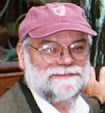For I can snore like a bullhorn
or play loud music
or sit up talking with any reasonably sober Irishman
and Fergus will only sink deeper
into his dreamless sleep, which goes by all in one flash,
but let there be that heavy breathing
or a stifled come-cry anywhere in the house
and he will wrench himself awake
and make for it on the run - as now, we lie together,
after making love, quiet, touching along the length of our
bodies,
familiar touch of the long-married,
and he appears - in his baseball pajamas, it happens,
the neck opening so small
he has to screw them on, which one day may make him wonder
about the mental capacity of baseball players -
and flops down between us and hugs us and snuggles himself
to sleep,
his face gleaming with satisfaction at being this very
child.
In the half darkness we look at each other
and smile
and touch arms across his little, startling muscled body -
this one whom habit of memory propels to the ground of his
making,
sleeper only the mortal sounds can sing awake,
this blessing love gives again into our arms.#
Two
selections from a poem by Galway Kinnell, maybe our greatest poet, writing
about his mother in the poem "The Last Hiding Place of Snow":
Once
in a while, passing the place,
I
have imagined I heard
my
old mother calling, thinking out loud her
mother-love
toward me, over those many miles
from
where her bones lie,
five
years
in
earth now, with my father's thirty-years' bones.
I
have always felt
anointed
by her love, its light
like
sunlight
falling
through broken panes
onto
the floor
of
a deserted house: we may go, it remains,
telling
of goodness of being, of permanence.
So
lighted I have believed
I
could wander anywhere,
among
any foulness, any contagions,
I
could climb through the entire empty world
and
find my way back and learn to be happy.
[later
in the same poem]:
Even
now when I wake at night
in
some room far from everyone,
the
darkness sometimes
lightens
a little, and then,
because
of nothing,
in
spite of nothing,
in
an imaginary daybreak, I see her,
and
for that moment I am still her son
and
I am in the holy land
and
twice in the holy land, remembered
within
her, and remembered in the memory
her
old body slowly executes into the earth.
|




No comments:
Post a Comment